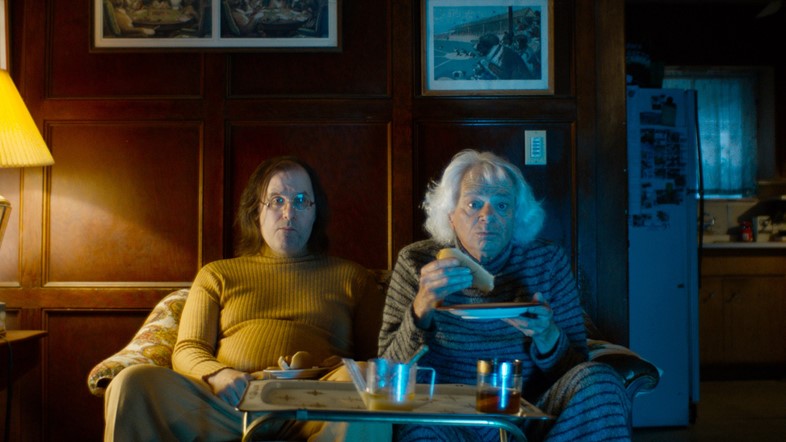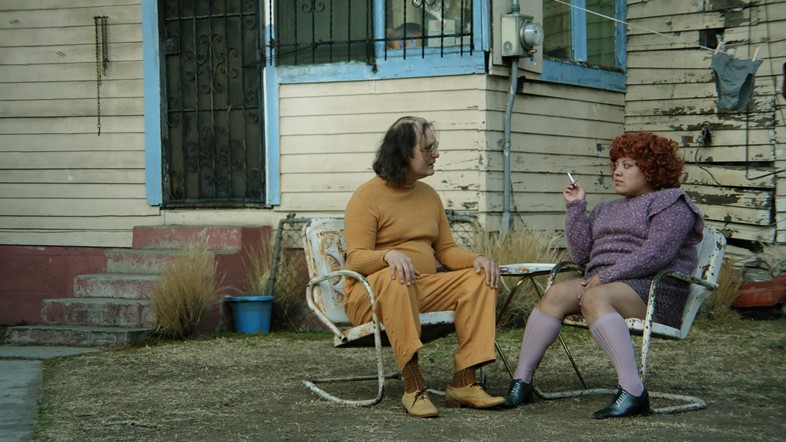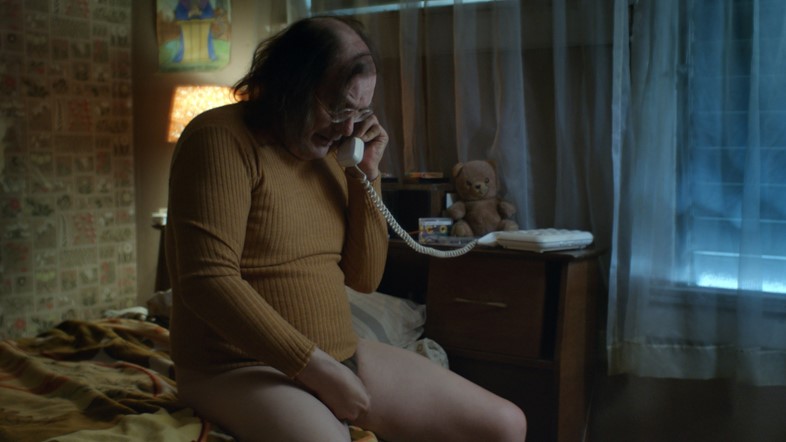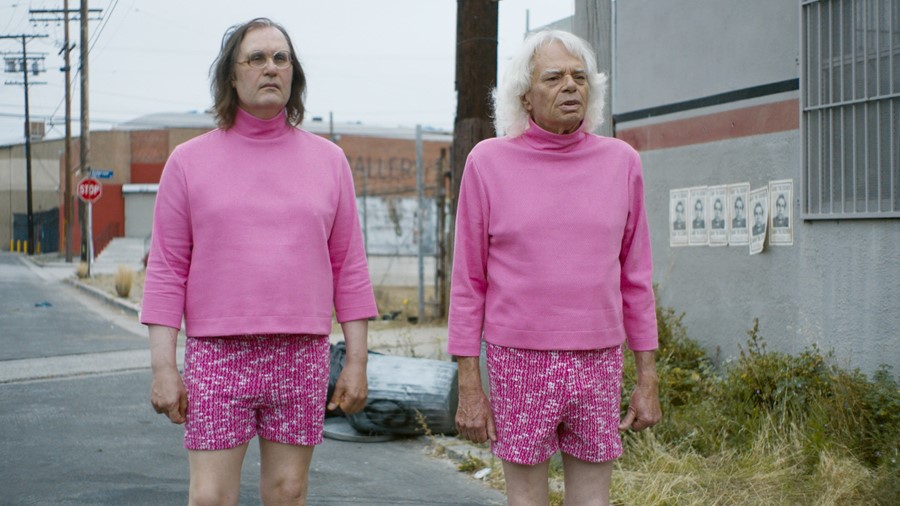We speak to director Jim Hosking and co-writer Toby Harvard about their divisive debut feature, The Greasy Strangler, a tale of disco, death and debauchery
As the closing credits roll on Jim Hosking’s debut film The Greasy Strangler, in a BFI screening room on Stephen Street, the industry chitter chatter that normally heralds the end of a preview is replaced by a stunned silence; the journalists in attendance shuffling out of the door in a dumbstruck haze. “I honestly didn’t intend to shock anyone,” the British director laughs down the phone, after being recounted this tale. “I just set out to make a film that I would find really funny to watch, but people have come up to me after screenings looking like they’ve been assaulted – wide-eyed and sweaty!”
There is no doubt that The Greasy Strangler, which counts Elijah Wood and Ben Wheatley among its producers, is not a film for the faint-hearted. It spends an hour and a half doling out a sensory pummelling to its viewers in a manner not dissimilar to one of its funniest leitmotifs: a scene that sees the leading star Michael St Michaels (AKA Big Ronnie) prising his wrinkly and cartoonishly well-endowed body into a carwash to be whipped clean by its vast revolving brushes. But for those who enjoy watching episodes of Bottom on repeat and chuckle gleefully at early John Waters films, The Greasy Strangler – filled as it is with revolting levels of depravity, the foulest of foul language, streams of weird and wonderful dialogue, and lashings of filth – will be welcomed with open arms.
It tells the tale of grease-gobbling, disco-obsessed Big Ronnie and his long-haired, nice-but-dim son Brayden (Sky Elobar), who live together in perfect disharmony. They run “disco walking tours” across Los Angeles (highlighting sites of dubious importance to the disco era while decked in matching pink shorts and polo-necks), squabble over who’s the bigger “bullshit artist”, and end up falling for the same girl. Throw into the mix the fact that one of them may or may not jump into a vat of animal fat before embarking on compulsive killing sprees and you’re in for a viewing experience like no other.
“I wanted every element – be it the music or locations – to feel interesting or remarkable somehow,” Hosking explains. “Like a strange world that you would fall into and, whether you enjoyed being in it or not, you wouldn’t forget about having been there.” This is something he certainly achieves, with the help of a hypnotising electro soundtrack by Andrew Hung (of Fuck Buttons fame) and sumptuously colour-saturated cinematography by Mårten Tedin, not to mention the hyper-surreal script, which Hosking drafted with friend and long-time collaborator Toby Harvard. Here, ahead of the film’s release tomorrow, we catch up with Hosking and Harvard to discover more about the writing process, their myriad inspirations and the anxiety of making a movie that is completely unapologetic.

On meeting each other and writing The Greasy Strangler...
Toby Harvard: “We first met 12 years ago when Jim was directing commercials and I was his storyboard artist. We live close to each other so we became chummy and at a certain point decided to start writing together. A lot of our early scripts raised some eyebrows! Eventually we got put in touch with Andy Starke and Ben Wheatley and we made the short film G is for Grandad (The Abcs of Death 2), then off the back of that The Greasy Strangler got picked up. It’s been a long journey: a lot of writing, a lot of trying out ideas, a lot of developing a style together.
The producer Ant Timpson compared us to two school boys at the back of the class drawing obscene pictures. That’s precisely what it is: I’ll send him a scene knowing that it’s going to get a reaction. It might be: ‘I can’t believe you fucking wrote this – it’s so stupid. I can never ask an actor to say that’ but then that just spurs us on to go even further. We have this thing called ‘trumpage' where I’ll write something ridiculous, then he’ll make it even more ridiculous, and then I’ll make it even more ridiculous and by the end you’ve got a three-page scene where the dialogue back and forth is just ‘bullshit artist’ [laughs].”
On the writing and filming process…
Toby Harvard: Early on we meet up and go for a lot of walks and talk about initial ideas. Then we develop the story, sending a document back and forth. After that, we start refining that to something that looks more like a scene list and then we just write it. It’s all very quick and instinctive, almost a stream of consciousness. I completely step back during the filming. I’m a sounding board for Jim, but I always know that he’s going to do something really funny. Also, I get to be objective – I can see the early cuts and give my opinion without any bias.

On writing an American script with a British sense of humour...
Toby Harvard: “We’ve both spent a lot of time in the US and we’re fascinated by the way people talk over there and their vocal ticks. We find it really funny. Phrases like ‘bullshit artist’ that you don’t hear that much… it just makes us laugh. But I think the humour in The Greasy Strangler is quite English – it’s quite Steptoe and Son or Vic and Bob.
People compare it to John Waters and Tim And Eric neither of which I know much about but for me, in terms of influences, I grew up on trashy 80s VHS horror films, like Maniac Cop – it’s still one of my favourite films. But then I like Harold Pinter, Bottom – very character driven, very claustrophobic dramas. So I see it as Maniac Cop meets Carnal Knowledge by Mike Nichols, where it’s two men who love each other and hate each other and can’t function without each other.”
On the creation of awkwardness…
Jim Hosking: “I didn’t really rehearse at all actually. I had a 15-minute rehearsal with Michael and Sky, who play the father and son. But then Michael – who plays Ronnie and has ingested copious amounts of drugs throughout the 1960s and 70s, probably 80s, maybe 90s – very quickly couldn’t remember any of his lines and it felt a bit pointless! But because I was casting some pretty peculiar characters, I wanted it to have an awkwardness and a strangeness about it; to keep it as fresh as possible. When I was editing the film, I would have producers saying to me, ‘Every time the characters stop speaking, you feel like somebody else will speak straight away but then there’s this weird pause where nobody speaks, and then they start speaking. Could you tighten it all up a bit?’ And I’d say, ‘But I tried really, really hard to make it feel like that!’”

On the pros and cons of being given free reign…
Jim Hosking: “It’s a low budget film with a really strong, uncompromising script so you’re either in it 100% or you wouldn’t want to be involved it at all. So I was given pretty much free reign with everything – from the very first call I had with the producers where I said I wanted to cast unknown actors – but I’m sure there were a few raised eyebrows along the way. I know that when they saw the first cut, that was about 45 minutes longer, it felt properly deranged, and not necessarily in a good way. I had my head in my hands thinking, ‘God can I really show this to anybody? It seems like it’s been made by somebody with some real mental problems [laughs].’ I wanted it to feel like it was too much to take. But there’s that fine line – ‘Oh this is really interesting: it’s too much’ or ‘this is just too much: nobody can take it!’”
On seeing the film come together…
Jim Hosking: “When it was finished I felt a mixture of relief and nausea and then very fleeting moments of pride and satisfaction, followed by more insecurity. I wanted to make something that was quite experimental, and therefore not built on very secure foundations, but I felt really happy because I knew I’d made something that was very much of me. At the same time you just don’t know how anyone will react to it. One thing my producer Andy Starke said was, ‘You can’t make a film like The Greasy Strangler and care what anybody thinks.’ And, although I do care, it’s true because it’s a very unapologetic film. There’s some dialogue in it that’s on the edge of acceptability but then that’s just what these characters do – they’re imbecilic, like spoilt, self-indulgent children who are totally insensitive. They can behave appallingly because they’re unevolved characters in an amoral world where there are no consequences. I find characters and relationships interesting and this film is just one side of that. To me it’s quite a sad film in some ways – there’s humanity and sweetness within it, but definitely hidden behind some filthy stuff.”
On upcoming projects...
Jim Hosking: “I wanted the challenge of making something different next time and for the next film I’m shooting in January, which I wrote with another friend, I’m working with really established actors and it’s got a very complicated plot so I think it will be.”
Toby Harvard: “Together we’ve got a lot of things that we’re in various stages of working on – a TV thing and another couple of films we’re trying to get going. Then Jim will do stuff with other people, I’ll do stuff with other people but I know with Jim it’s always going to be fun and challenging – that we’re going to always keep pushing ourselves to do something unexpected and different, that speaks to us.”
The Greasy Strangler is in cinemas nationwide from October 7 and available to own from October 10, 2016.
